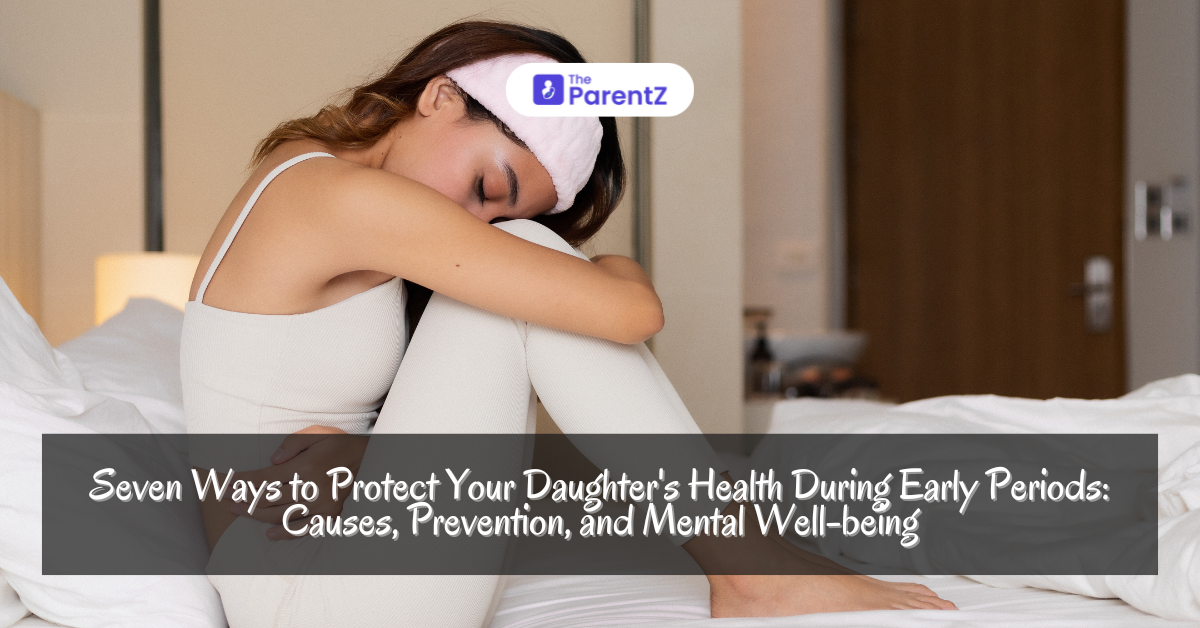Early puberty, particularly the onset of menstruation, can be a challenging time for young girls and their parents. This article aims to provide a comprehensive guide on protecting your daughter’s health during her early periods, covering the causes, prevention strategies, and considerations for her moral and mental well-being. We’ll also explore the potential long-term health and growth implications of early menstruation.
Understanding Early Menstruation
Early menstruation, also known as precocious puberty, occurs when a girl starts her periods before the age of 8. This can be triggered by various factors including genetics, environmental influences, and health conditions.
Causes of Early Menstruation
- Genetics
- Family history plays a significant role. If a mother or close female relative experienced early puberty, the daughter might too.
- Obesity
- Higher body fat can lead to increased production of estrogen, a hormone that triggers puberty.
- Environmental Factors
- Exposure to endocrine-disrupting chemicals (EDCs) found in plastics, personal care products, and pesticides can accelerate puberty.
- Health Conditions
- Certain medical conditions like endocrinologies which disrupt the hypothalamus pituitary axis or adrenal disorders can also cause early puberty.
Prevention Strategies
- Maintain a Healthy Diet
- A balanced diet rich in fruits, vegetables, lean proteins, and whole grains can help manage body weight and hormone levels.
- Avoid Processed Foods: Limit the intake of processed foods high in sugar and unhealthy fats.
- Encourage Regular Physical Activity
- Regular exercise can help maintain a healthy weight and reduce the risk of early puberty.
- Promote Active Play: Encourage activities like swimming, dancing, or sports.
- Limit Exposure to Endocrine Disruptors
- Use natural or organic personal care products.
- Be Cautious with Plastics: Avoid heating food in plastic containers and choose BPA-free products.
- Monitor Health Conditions
- Regular check-ups with a pediatrician can help identify and manage health conditions that may contribute to early puberty.
- Educate About Body Changes
- Prepare your daughter for puberty by discussing the changes her body will go through.
- Open Communication: Foster an environment where she feels comfortable asking questions.
- Provide Emotional Support
- Early puberty can be emotionally challenging. Offer reassurance and support to help her navigate this transition.
- Encourage Peer Support: Connecting with peers who are going through similar experiences can be beneficial.
- Seek Professional Guidance
- If early puberty is a concern, consulting with a pediatric endocrinologist can provide specialized care and treatment options.
Moral and Mental Health Considerations
Addressing Body Image and Self-esteem
- Positive Body Image: Promote a positive body image by emphasizing health and functionality over appearance.
- Avoid Comparisons: Discourage comparisons with peers and media portrayals.
Managing Peer Relationships
- Bullying Prevention: Educate your daughter about bullying and how to seek help if she experiences it.
- Social Skills: Encourage the development of healthy friendships and social skills.
Emotional Well-being
- Stress Management: Teach stress management techniques such as deep breathing, mindfulness, and physical activity.
- Professional Support: Consider counseling or therapy if your daughter struggles with anxiety or depression related to early puberty.
Long-term Health and Growth Implications
Physical Health
- Bone Health
- Early menstruation can lead to a shorter growth period, potentially resulting in shorter adult height.
- Calcium and Vitamin D: Ensure a diet rich in calcium and vitamin D to support bone health.
- Increased Risk of Health Issues
- Girls who experience early puberty may have a higher risk of developing conditions like breast cancer, ovarian and endometrial pathologies later in life.
- Healthy Lifestyle: Encourage a lifelong commitment to a healthy lifestyle to mitigate these risks.
Emotional and Social Development
- Psychological Impact
- Early puberty can lead to increased rates of anxiety, depression, and low self-esteem.
- Open Dialogue: Maintain open lines of communication to support her emotional health.
- Academic and Social Challenges
- Early-developing girls may face academic and social challenges due to being out of sync with their peers.
- School Support: Work with school counselors and teachers to provide the necessary support.
Conclusion
Navigating early menstruation requires a holistic approach that addresses physical, emotional, and social well-being. By understanding the causes and implementing prevention strategies, parents can help mitigate the challenges associated with early puberty. Providing emotional support and fostering a positive environment can significantly impact your daughter’s mental health and self-esteem. Long-term health considerations should not be overlooked, and promoting a healthy lifestyle from a young age can reduce the risk of future health issues.
Protecting your daughter’s health during early periods is a vital step in ensuring her overall well-being and supporting her through this significant life transition. By staying informed and proactive, you can help your daughter navigate early puberty with confidence and resilience.








Be the first one to comment on this story.